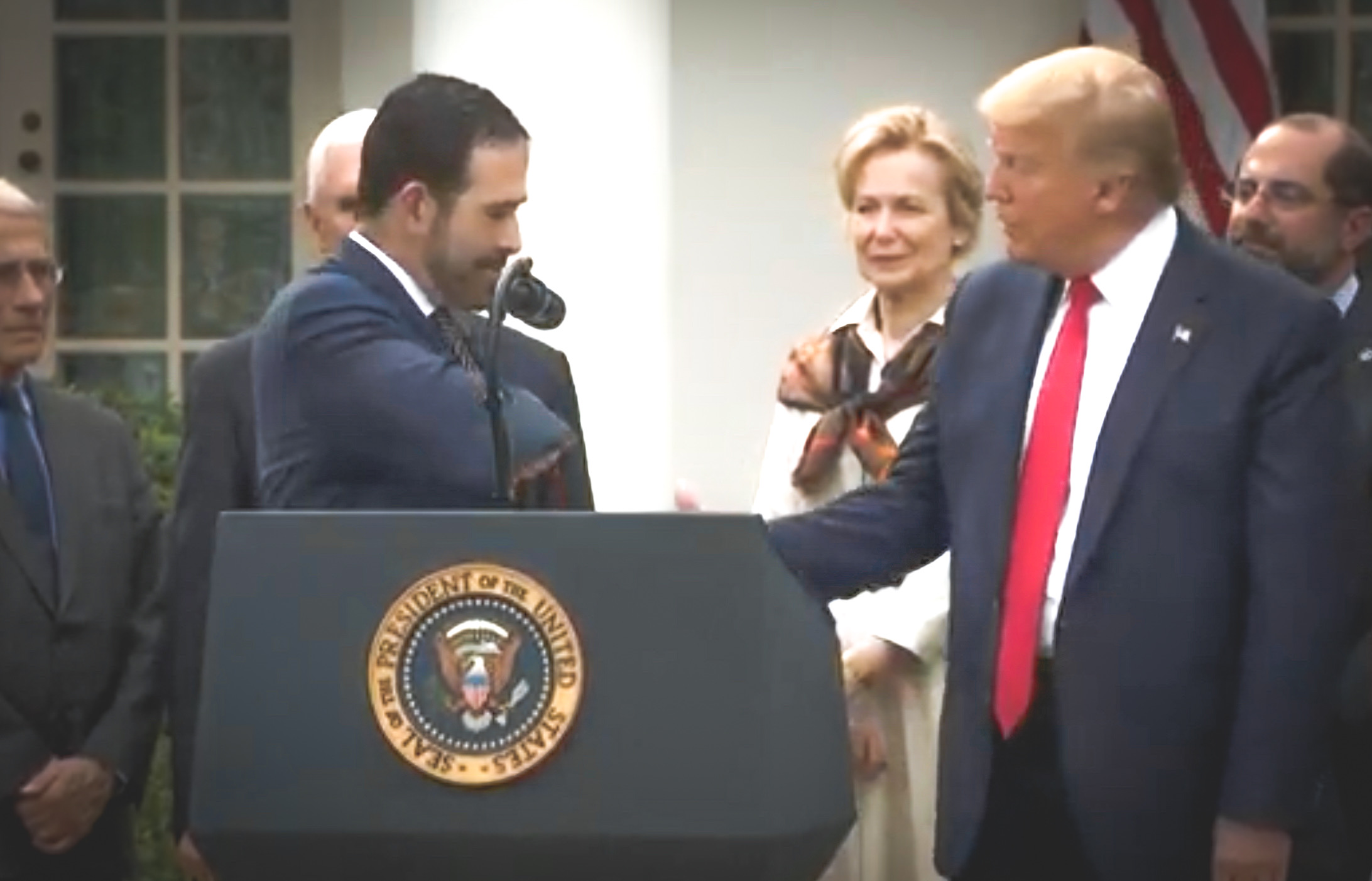“President Trump, LHC Group’s Greenstein Address Nation Amid Coronavirus Pandemic,” gloats the online trade publication HHCN (Home Health Care News), a subsidiary of the cheekily-named Aging Media Network. The headline may have been somewhat hyperbolic, but it’s not entirely inaccurate. During his meandering and occasionally contradictory press conference at the Rose Garden on Friday, Donald Trump briefly ceded the microphone to Bruce Greenstein, who managed to steal some of the spotlight when he politely refused to shake the president’s hand, instead offering an “elbow-bump” (not to be confused with the Obama-era national security scandal resulting from the notorious “terrorist fist jab”).
While Bruce Greenstein may be a name unfamiliar to most Americans, if you ask anyone working in healthcare administration in Louisiana, they’ll likely be able to tell you about the saga of former Department of Health and Hospitals Secretary, Bruce David Greenstein.
The fall and rise of Greenstein, 51, would have been difficult to imagine, only four years ago. At the time, he was reportedly struggling to find steady employment, even in Washington State, where he’d lived before Bobby Jindal poached him from Microsoft and appointed him to run Louisiana’s sprawling healthcare department, the same job that Jindal had when he was only 24.
That said, if there was to be a second act in Greenstein’s career, then it would have been impossible to imagine it occurring anywhere other than Louisiana.
Four years ago, he was confronting the very real possibility of serving time behind bars and staring at nine felony indictments that a special grand jury handed him following an exhaustive 18-month-long investigation into his role, as DHH Secretary, in awarding a lucrative, mega-million dollar contract to his former employer, the Maryland-based company Client Network Services Incorporated, better known by its acronym, CNSI. All nine indictments pertained to allegations that Greenstein had committed perjury in testimony he provided to investigators as well as to the state legislature.
The $200 million contract was for upgrading Louisiana’s system for determining Medicaid eligibility, which had become a necessity following the passage of the Patient Protection and Affordable Care Act. Greenstein, who has always asserted his innocence, had been accused of altering the state’s Request for Proposals in order to advantage CNSI, which, for its part, has adamantly and consistently denied any wrongdoing.
Because of the state’s decision to cancel the proposed agreement with CNSI and to restart a new RFP process, the federal government ultimately provided Louisiana with special permission to continue using its outmoded system while the incoming administration of Gov. John Bel Edwards sorted out the mess they inherited from Jindal.
When the state’s legislative auditor published a report speculating that failures in evaluating Medicaid eligibility may have resulted in widespread fraud, Republican lawmakers attempted to turn the issue into a scandal, notwithstanding the legitimate criticisms about the auditor’s creative methodology and without even a glimmer of recognition that the deficiencies, insofar as they could be known, were entirely a consequence of the delays caused by alleged corruption during the previous administration.
Last year, Republican gubernatorial candidate Eddie Rispone used the issue to justify a baffling and potentially devastating proposal for a complete freeze on Medicaid enrollment, which, according to independent experts, could have resulted in more than 300,000 Louisianians needlessly losing their health insurance.

Prosecutors who had worked on securing the indictments against Greenstein believed they had built a solid case, but, for reasons that have never been explained to the public, in April of 2016, less than four months after former Congressman Jeff Landry took over as Louisiana attorney general, his office decided to drop the case against Greenstein.
We last reported on Greenstein in 2017, shortly after he was named the Trump administration’s new Chief Technology Officer for Health and Human Services. But as is the case with countless other appointees during Trump’s first year in office, Greenstein never moved too far away from the revolving door.
After a year as the CTO of HHS, Greenstein was hired as the newest Executive Vice President of Lafayette, Louisiana’s LHC Group, one of the nation’s three largest in-home senior care providers, where he now earns more than $1.5 million a year, according to documents filed with the SEC. (LHC’s oldest executive is a 75-year-old named W.J. Tauzin, though he’s better known in Louisiana by his nickname, Billy).
Those who know Greenstein personally say that he has been wildly mischaracterized, and there are reasons to believe that the former attorney general’s case against him had been flawed from the very beginning, including, most importantly, the fact that the state ultimately agreed that CNSI had not benefitted any fraudulent actions.
But considering he was asked by the President of the United States to inform the nation on how the in-home senior care industry is responding to a global pandemic, now might be a good time for Jeff Landry to finally explain the reasons he believed the state’s nine-count felony case against Bruce Greenstein fell apart.
